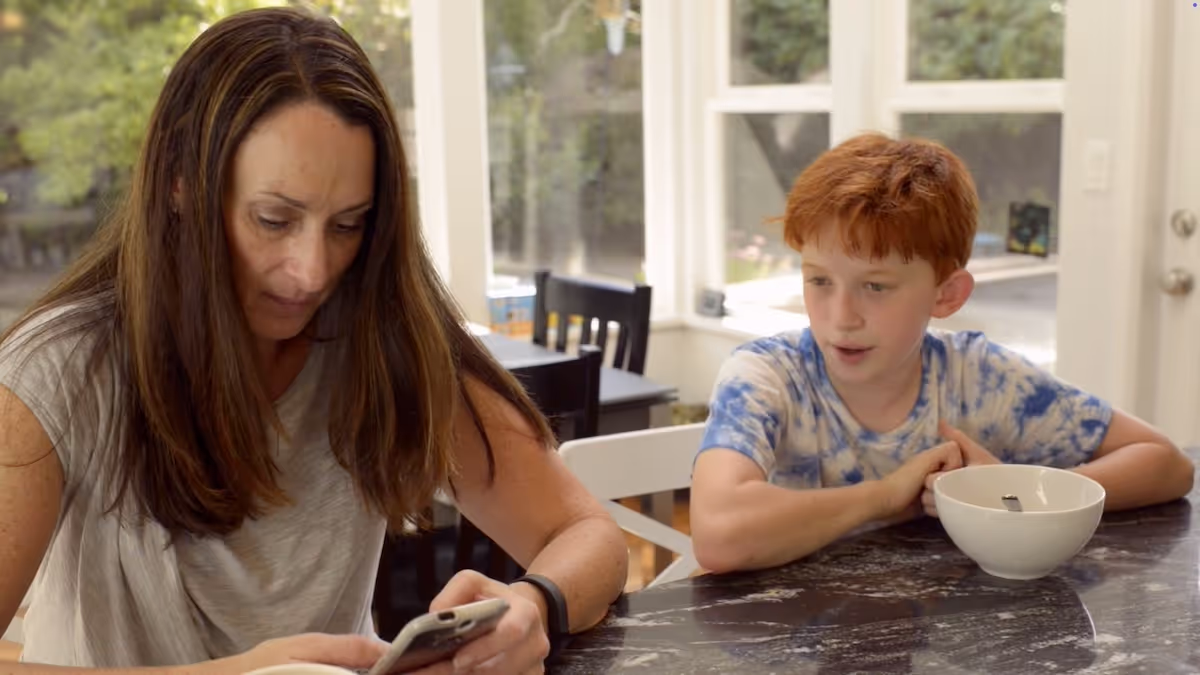


As the New Year begins, it's natural to think about resolutions and ways to improve our habits and routines, including tech time expectations. But instead of focusing on revamping screen time rules, I've been thinking about the moments over the past year when my family and I turned off, or turned over, our devices and were more present with each other.
In particular, I’ve been thinking about what I call “unspoken screen rules”--all the times we log off, consciously and unconsciously.
One of my resolutions was to talk with my family about all this over the weekend. My hope was that it would reinforce these good habits and that my family would feel appreciated.
I loved knowing that such a conversation would add positivity to our unspoken "family emotional piggy bank," which is great to have in the bank when tech troubles inevitably arise.
So I did just that. I shared some examples of times when I noticed that people in the family did not have their phones out or “logged off” in other ways. It was really fun to talk about all this.
Learn more about showing our movies in your school or community!
Join Screenagers filmmaker Delaney Ruston MD for our latest Podcast

Learn more about our Screen-Free Sleep campaign at the website!
Our movie made for parents and educators of younger kids
Learn more about showing our movies in your school or community!
It feels great that I already checked off one resolution by having that conversation! I’m all for a resolution that can be completed in a night. I got this idea from Jason Gay’s recent lighthearted article in the Wall Street Journal titled More New Year’s Resolutions You Can Actually Keep.
Learn more about showing our movies in your school or community!
Join Screenagers filmmaker Delaney Ruston MD for our latest Podcast

Learn more about our Screen-Free Sleep campaign at the website!
Our movie made for parents and educators of younger kids
Join Screenagers filmmaker Delaney Ruston MD for our latest Podcast
As we’re about to celebrate 10 years of Screenagers, we want to hear what’s been most helpful and what you’d like to see next.
Please click here to share your thoughts with us in our community survey. It only takes 5–10 minutes, and everyone who completes it will be entered to win one of five $50 Amazon vouchers.
As the New Year begins, it's natural to think about resolutions and ways to improve our habits and routines, including tech time expectations. But instead of focusing on revamping screen time rules, I've been thinking about the moments over the past year when my family and I turned off, or turned over, our devices and were more present with each other.
In particular, I’ve been thinking about what I call “unspoken screen rules”--all the times we log off, consciously and unconsciously.
One of my resolutions was to talk with my family about all this over the weekend. My hope was that it would reinforce these good habits and that my family would feel appreciated.
I loved knowing that such a conversation would add positivity to our unspoken "family emotional piggy bank," which is great to have in the bank when tech troubles inevitably arise.
So I did just that. I shared some examples of times when I noticed that people in the family did not have their phones out or “logged off” in other ways. It was really fun to talk about all this.
It feels great that I already checked off one resolution by having that conversation! I’m all for a resolution that can be completed in a night. I got this idea from Jason Gay’s recent lighthearted article in the Wall Street Journal titled More New Year’s Resolutions You Can Actually Keep.
Sign up here to receive the weekly Tech Talk Tuesdays newsletter from Screenagers filmmaker Delaney Ruston MD.
We respect your privacy.
As the New Year begins, it's natural to think about resolutions and ways to improve our habits and routines, including tech time expectations. But instead of focusing on revamping screen time rules, I've been thinking about the moments over the past year when my family and I turned off, or turned over, our devices and were more present with each other.
In particular, I’ve been thinking about what I call “unspoken screen rules”--all the times we log off, consciously and unconsciously.
One of my resolutions was to talk with my family about all this over the weekend. My hope was that it would reinforce these good habits and that my family would feel appreciated.
I loved knowing that such a conversation would add positivity to our unspoken "family emotional piggy bank," which is great to have in the bank when tech troubles inevitably arise.
So I did just that. I shared some examples of times when I noticed that people in the family did not have their phones out or “logged off” in other ways. It was really fun to talk about all this.

Thoughtful family tech rules help protect kids’ wellbeing, learning, and sleep while strengthening connection at home. Using the fresh start of a new year, this post shares eight practical tech habits families can discuss and adapt together, including shared social media check-ins, screen time inventories, device-free meals, regular gaming breaks, and keeping phones out of bedrooms at night.
READ MORE >
Psychologist Jean Twenge explains how parental controls can support healthier tech use by protecting sleep, limiting late night device access, and reducing kids’ exposure to content they are not developmentally ready to handle. She discusses why third party parental control tools are often more effective and easier to use than built in options, while acknowledging that no system is perfect. Clear boundaries, combined with technology based limits, can reduce ongoing conflict and make screen time rules easier to enforce.
READ MORE >
for more like this, DR. DELANEY RUSTON'S NEW BOOK, PARENTING IN THE SCREEN AGE, IS THE DEFINITIVE GUIDE FOR TODAY’S PARENTS. WITH INSIGHTS ON SCREEN TIME FROM RESEARCHERS, INPUT FROM KIDS & TEENS, THIS BOOK IS PACKED WITH SOLUTIONS FOR HOW TO START AND SUSTAIN PRODUCTIVE FAMILY TALKS ABOUT TECHNOLOGY AND IT’S IMPACT ON OUR MENTAL WELLBEING.
